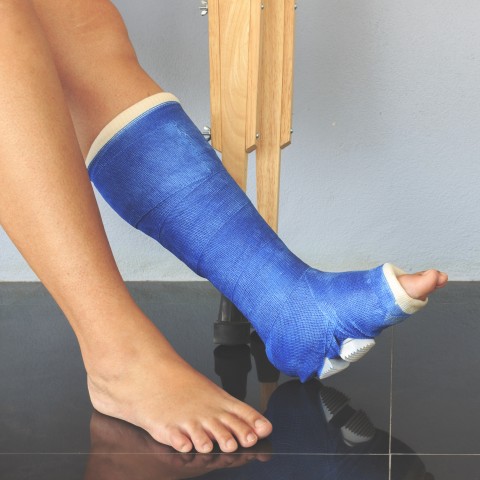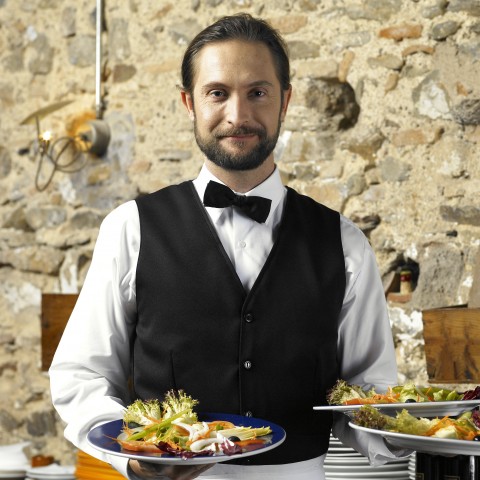
When you first start learning any language, the first few lessons can feel overwhelming. If Spanish grammar seems too challenging or vocabulary lists just aren’t for you, why don’t you start by picking up some simple Spanish phrases for beginners?
Fortunately, you’ll be able to handle the most basic interactions by learning just a few of these ready-to-go expressions and sentence patterns. Saying hello and goodbye, making small talk, ordering in a restaurant…it’s really not so complicated. You’ll see!
In this guide from SpanishPod101, you’ll find more than 50 easy Spanish phrases for beginners that’ll help you navigate a variety of situations using this beautiful language.

If you want to meet Spanish people, you’ll need to learn some
basic phrases—and how to give two kisses!
 Table of Contents
Table of Contents
- Greetings and Self-introductions
- Courtesy Phrases & Social Expressions
- Dining & Shopping Phrases
- Asking for Help
- Final Thoughts
1. Greetings and Self-introductions
First things first, let’s start by learning beginner phrases in Spanish for greeting others and introducing oneself in a conversation. This is one of the most basic interactions in any language, and learning these expressions will help you start off on the right foot. You probably know the meaning of the word hola, so you’re already on your way to mastering greetings and self-introductions in Spanish!
Let’s start with the most common greetings:
| Hola. | Hello. |
| Buenos días. | Good morning. |
| Buenas tardes. | Good afternoon. |
| Strictly speaking, you should change buenos días to buenas tardes right after noon. However, you’ll be surprised to learn that many Spanish people will say buenos días for a couple more hours. This is because many people don’t consider it to be the afternoon until they’ve had lunch, which in Spain tends to be quite late! | |
| Buenas noches. | Good evening. / Goodnight. |
Buenas noches is both a greeting and a farewell expression. Here are a couple of examples:
| |
As we’ve just seen, buenas noches is a common farewell expression. Here are some others:
| Adiós. | Bye. |
| Hasta luego. | Bye. / See you later. |
| In some regions in Spain, hasta luego is even more common than adiós. Even though it literally means “until later,” Spanish people don’t necessarily mean that they’ll see the other person ever again. It can be a bit confusing sometimes! | |
| Hasta pronto. | See you soon. |
| Nos vemos. | See you. |
| Que vaya bien. | Wish you well. / Have a nice one. |
| Que tengas un buen día. [informal] Que tenga un buen día. [formal] | Have a nice day. |
| Cuidate. | Take care. |
- → Do you want to learn other ways to say goodbye in Spanish? Here’s SpanishPod101’s guide.
If you’re meeting someone for the first time, here are some useful Spanish phrases you can use to introduce yourself:
| Me llamo… | I’m… |
| Soy… | I am… |
| Mi nombre es… | My name is… |
The three expressions above mean basically the same thing. However, Me llamo… is the most common one, and Mi nombre es… is the most formal one.
| |
| ¿Cómo te llamas? | What’s your name? |
| Encantado de conocerte. [masculine] Encantada de conocerte. [feminine] | Nice to meet you. |
| Mucho gusto. | Nice to meet you. |
| ¿De dónde eres? | Where are you from? |
| Soy de… | I’m from… |
- → Please visit our complete guide on how to introduce yourself in Spanish for even more phrases and sentence patterns.

¿Cómo va? (“How’s it going?”)
2. Courtesy Phrases & Social Expressions
Once you’ve gotten past the greetings and introductions, it’s important to keep the conversation alive (as long as you can, anyway!). In this section, you’ll learn the most basic Spanish phrases for beginners that will help you master polite conversations with native Spanish speakers.
Here are the most important courtesy phrases in Spanish:
| Gracias. | Thank you. |
| Muchas gracias. | Thank you so much. |
| De nada. | You’re welcome. |
| Por favor. | Please. |
| Disculpa. [informal] Disculpe. [formal] | Excuse me. |
| Perdón. | Sorry. |
| Perdón can be used in various forms. If you want to directly appeal to the person you’re saying sorry to, you can say the informal version (perdona) or the formal one (perdone). These words can also be used as a way to say “excuse me.” But if you’re apologizing for something really serious, you should say perdóname (“forgive me”).
| |
| Lo siento. | I’m sorry. |
| No te preocupes. | Don’t worry. |
| No pasa nada. | That’s okay. |
To get a conversation flowing, you’ll need some additional phrases. Here are some useful small talk expressions to get you started:
| ¿Qué tal? | How’s it going? / How are you doing? |
| ¿Cómo estás? | How are you? |
| ¿Cómo va? | How’s it going? |
| The three expressions above mean more-or-less the same thing, and they can be used in most conversations. However, each one has a slightly different shade. ¿Qué tal? is a very generic expression that can be used as a greeting. You might be asking about how the other person is, asking about a situation, or maybe just greeting the other person without expecting any response. ¿Cómo estás? is also used mainly as a small talk phrase. You wouldn’t expect the other person to get too deep with their answer, unless it’s someone close to you or if you’re having an intimate conversation. ¿Cómo va? is even more casual and generic than the two expressions mentioned above. It can be used as a greeting, too. ¡Hola, Amanda! ¿Cómo va? | |
| Estoy bien, gracias. | I’m well, thank you. |
| Que te recuperes pronto. | Get well soon. |
| Me alegro de verte. | It is good to see you. |
| Saluda a … de mi parte. | Say hello to … on my behalf. |
In Spain, it’s polite to ask about the other person’s family or common acquaintances. Before finishing the conversation, you can tell him/her to give them your best.
| |
- → Still confused about how to be polite in Spanish? Learn how to avoid impoliteness (and other mistakes) by reading through our guide!

Que te recuperes pronto. (“Get well soon!”)
3. Dining & Shopping Phrases
If you travel to Spain, dining out and popping into the local shops will give you some great opportunities to practice your Spanish. If you go to a restaurant, it’ll be important to know how to politely ask for a table or order some food; in shops, you’ll need to know how much the item you like costs!
Here are some simple Spanish phrases for beginners that will be very useful to you:
| ¿Podría ayudarme, por favor? | Could you help me, please? |
| ¿Cuánto cuesta? | How much is it? |
| ¿Cuánto es? | How much is it? |
| ¿Puedo pagar con tarjeta? | Can I pay with a credit card? |
| ¿Puedo pagar con efectivo? | Can I pay with cash? |
| ¿Tienen mesa para … personas? | Do you have a table for … people? |
| When you go to a restaurant with a party of people, it’s polite to ask if they have room for all of you. Alternatively, you could say: Querría una mesa para … personas. (“I’d like a table for … people.”) | |
| Tengo una mesa reservada. | I have a reservation. |
| Querría pedir… | I’d like to order… |
| No como… | I don’t eat… |
| Soy vegetariano / vegano. [masculine] Soy vegetariana / vegana. [feminine] | I’m a vegetarian / vegan. |
| Historically, the gastronomy of many Spanish regions has been very meat-oriented. Nowadays, things are changing, and vegetarianism and veganism are increasingly popular in Spain. This means that there are now more vegetarian and vegan options in restaurants than were previously available. However, don’t forget to say soy vegetariano or soy vegano before ordering your food if you don’t want to find unexpected chorizo (Spanish sausage) or jamón (ham) on your plate! | |
- → Feeling hungry? Here’s the Ultimate Guide to Spanish Food on SpanishPod101’s blog.

Querría pedir la ensalada. (“I’d like to order a salad.”)
4. Asking for Help
Some of the most common situations where you might have to rely on Spanish are, unfortunately, those where you’re in need of assistance. If you’re lost or feeling sick, having these simple Spanish phrases for beginners at hand will be crucial.
| ¿Hablas inglés? | Do you speak English? |
| No te entiendo, lo siento. | I don’t understand you, I’m sorry. |
| No hablo muy bien el español. | I don’t speak Spanish properly. |
| ¿Cómo se dice … en español? | How do you say … in Spanish? |
| ¿Dónde está…? | Where is…? |
| ¿Cómo puedo llegar a…? | How can I get to…? |
| ¡Ayuda! | Help! |
| ¡Socorro! | Help! |
| Necesito un médico. | I need a doctor. |
| Llamad a una ambulancia. | Call an ambulance. |
- → Learn how to ask for directions with this guide from SpanishPod101, and check out our vocabulary list Words and Phrases to Help You in an Emergency.

¿Cómo puedo llegar a la estación? (“How can I get to the station?”)
5. Final Thoughts
In this guide to basic Spanish phrases for beginners, you’ve learned more than 50 of the most common Spanish expressions for different contexts. It’ll be a useful tool for you as you navigate your very first conversations in Spanish, and you can always refer back to it even as you progress in your studies.
If you want to take your Spanish-learning journey further, don’t forget to check out SpanishPod101.com. We have plenty of free vocabulary lists to expand your Spanish vocabulary, as well as useful lessons for every level. We recommend creating your free lifetime account today and getting started with our Level 1 Spanish pathway.
Good luck!










